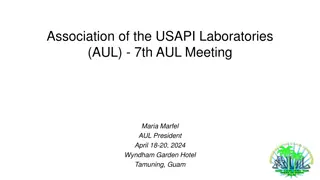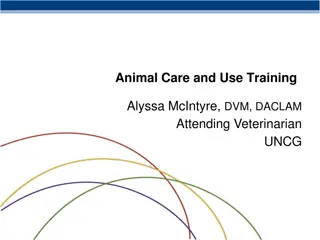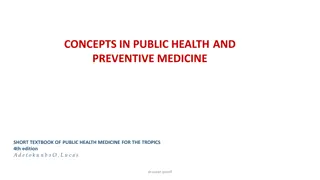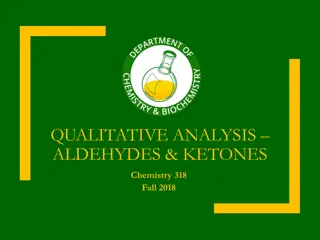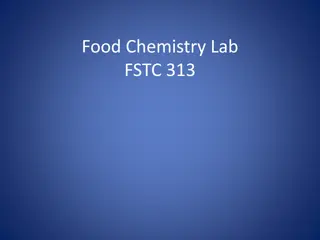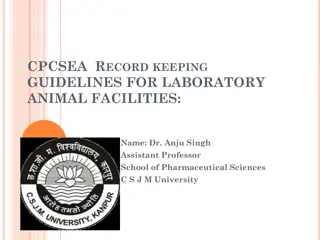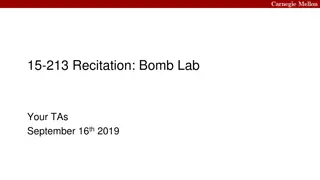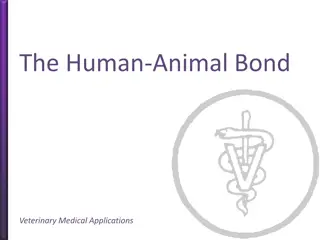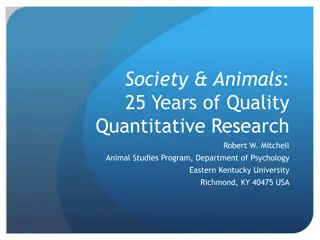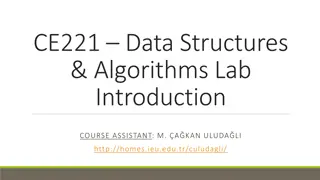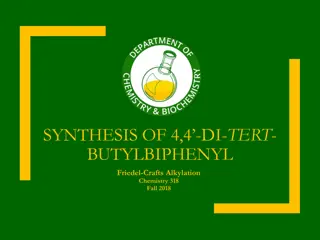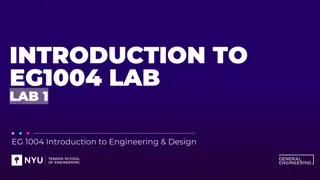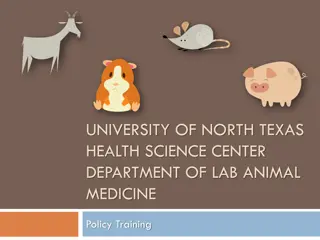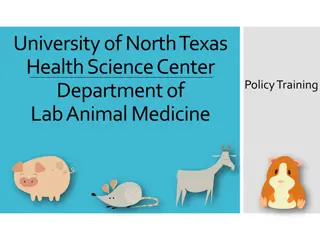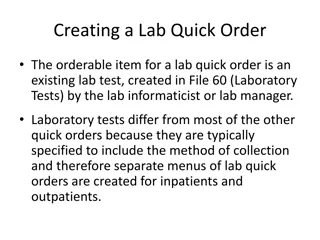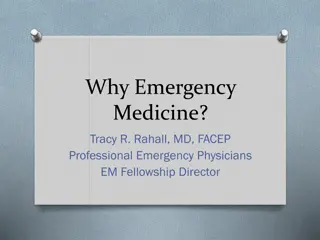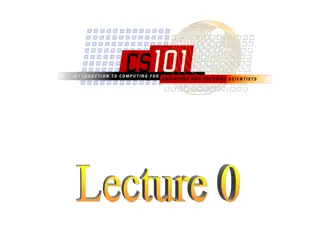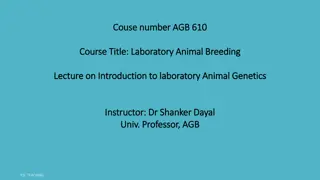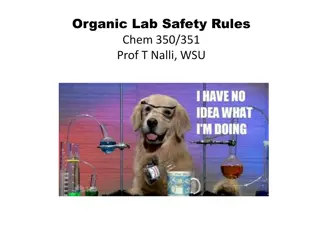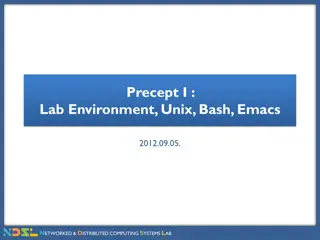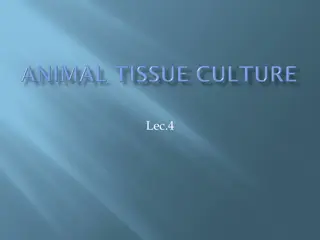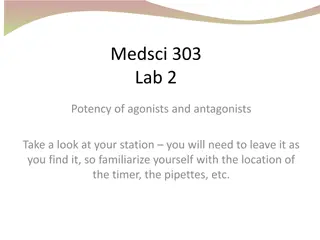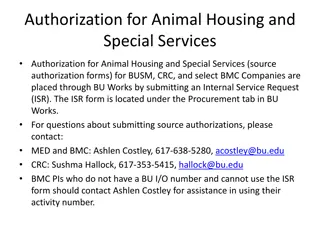History and Educational Programs of DEU Lab Animal Science Department
Established in 2004, the Department of Laboratory Animal Science at Dokuz Eylul University Institute of Health Sciences offers cutting-edge education focusing on animal welfare and ethical practices in scientific research. The department upholds the 3R Principle—Reduction, Refinement, Replacement�
0 views • 9 slides
Responsibilities of Facility Animal Care Committee at McGill University
The Facility Animal Care Committee (FACC) at McGill University oversees animal activities, ensures ethical treatment of animals, and adheres to guidelines from organizations such as the Canadian Council on Animal Care (CCAC). Responsibilities include continual oversight of animals, approving care pr
1 views • 13 slides
Comprehensive Overview of ABE Lab Manual and Foundations of Biotech Package
The ABE Lab Manual, authored by Doreen Osgood, MS, PhD, is a comprehensive resource for biotechnology education, including sequences like Genetic Engineering and Colony PCR. The manual includes teacher and student guides, along with related resources like PowerPoint presentations and lists of labora
1 views • 5 slides
Exploring the Reasons Behind Cannabis Lab Testing
Cannabis lab testing has become an integral aspect of the cannabis industry, ensuring that consumers have access to safe, high-quality products. In this comprehensive guide, weu2019ll explore the reasons behind cannabis lab testing and why itu2019s crucial for both consumers and producers alike.\n\n
12 views • 1 slides
Understanding Lifestyle Medicine: A Holistic Approach to Health
Lifestyle medicine is a medical specialty focused on using evidence-based lifestyle interventions to treat chronic conditions like cardiovascular diseases, type 2 diabetes, and obesity. Clinicians trained in lifestyle medicine emphasize whole-person care through nutrition, physical activity, stress
10 views • 10 slides
MD MS IN UK WITHOUT PLAB,PG MD MS IN UK
MD MS IN UK WI Internal Medicine without PLAB is a Three Years Full Time Hands on Training Program. The course constitutes hands-on training in all major clinical specialties e.g. Cardiology, Acute Medicine, Gastroenterology, Diabetes, Psychiatric Medicine, Stroke Medicine and Neurology and others,
7 views • 4 slides
Unlocking the Benefits of Sleep Lab Services with Medkarma
In today's fast-paced world, quality sleep is more important than ever. Sleep disorders, which can significantly impact overall health and well-being, are on the rise. This is where sleep lab services come into play. Medkarma, a leading name in the healthcare industry, offers top-notch sleep lab ser
1 views • 7 slides
Association of the USAPI Laboratories (AUL) Overview
The Association of the USAPI Laboratories (AUL) was established to strengthen lab networks in the USAPI countries, promote excellence in laboratory services, serve as a resource for USAPI laboratories, and impact health planning through lab-based surveillance. Key initiatives include adopting lab st
0 views • 14 slides
Animal Welfare and Ethics: Standards and Regulations in India
The content covers a wide range of topics related to animal welfare, ethics, and laws in India. It delves into the definition of animal welfare, the role of veterinarians, animal welfare organizations, regulations like the Prevention of Cruelty to Animals Act, and protection of wildlife, working ani
0 views • 15 slides
Importance of Training in Animal Care and Use for Research
Training in animal care and use is essential to ensure humane and appropriate treatment of research animals, promote regulatory compliance, and uphold high standards of science and animal well-being. The presentation covers the necessity of training, goals including reviewing animal use and identify
0 views • 53 slides
Understanding Complementary and Alternative Medicine (CAM)
Complementary and Alternative Medicine (CAM) encompasses various treatments, ranging from herbs to yoga, that differ from traditional Western medicine. While complementary medicine involves using these therapies alongside conventional medicine, alternative medicine opts for non-mainstream approaches
2 views • 20 slides
Understanding the Difference: Animal Rights vs. Animal Welfare
Explore the nuanced distinction between animal rights and animal welfare, delving into the ethical considerations, philosophies, and advocacy efforts surrounding these concepts. Discover how animal rights proponents emphasize the equal rights of animals, while animal welfare focuses on humane treatm
0 views • 36 slides
Understanding Concepts in Public Health and Preventive Medicine
The evolution of nomenclature in public health, from hygiene to preventive medicine and social medicine, reflects the collective efforts to prevent disease, prolong life, and promote health. Key elements of modern public health include collective responsibility, state intervention, prevention emphas
0 views • 16 slides
Qualitative Analysis of Aldehydes and Ketones in Chemistry Lab
In this Chemistry 318 lab, students will conduct qualitative analysis of aldehydes and ketones using chemical and spectroscopic methods. The lab includes classification tests, spectroscopy (IR, 1H-NMR/13C-NMR, MS), and identification of unknown compounds. Experimental procedures involve physical eva
1 views • 11 slides
Food Chemistry Lab FSTC 313 Rules and Regulations
In the Food Chemistry Lab FSTC 313, students are expected to adhere to strict guidelines regarding attendance, lab safety, late policies, missed lab policies, and technical abstract requirements. The lab emphasizes group work, application notes for the food industry, and individual abstract writing
4 views • 24 slides
Opportunities for Undergraduates in Health Research Lab
The Mohan Research Lab offers undergraduates the chance to conduct impactful research that can be published, focusing on biomarkers and targets for autoimmune diseases and cancers. Led by an international team of researchers, the lab provides a collaborative environment for students to engage in cut
4 views • 12 slides
Laboratory Animal Facilities Record-keeping Guidelines
Guidelines for maintaining records in laboratory animal facilities include provisions for animal housing, staff records, health monitoring, and standard operating procedures. Compliance with CPCSEA regulations ensures ethical review procedures for animal research proposals. Focus is on providing a s
6 views • 11 slides
15-213 Recitation: Bomb Lab Overview and Tips
This content covers the Bomb Lab exercise in x86-64 assembly code and GDB debugging techniques. It explains the purpose of Bomb Lab, downloading the bomb, detonating the bomb, hints for solving phases, and x86-64 Linux register usage. The material emphasizes the importance of using GDB for efficient
0 views • 42 slides
Exploring the Human-Animal Bond in Veterinary Medicine
Delve into the significance of the human-animal bond in veterinary medicine, highlighting the mutually beneficial relationship between animals and humans over time. Understand how this bond has evolved, the role of veterinary assistants in fostering this connection, and the changing dynamics of huma
0 views • 26 slides
Precision Assembly Lab Guidelines
This guide provides step-by-step instructions on how to perform a precision assembly lab effectively. From understanding lab assignments to seeking assistance and proper documentation, this resource covers key aspects to ensure a successful lab experience. Following these instructions will help you
1 views • 11 slides
Clemson ECE Laboratories - Electronics Lab Information
Explore pre-labs for ECE 311 Electronics Lab I, created by Steven Chambers in Fall 2012 at Clemson University. The labs cover topics like curve tracer plots for diodes and transistors, background on Bipolar Junction Transistors (BJTs), instructor and lab coordinator contact information, mandatory sa
0 views • 69 slides
Exploring Human-Animal Interactions through 25 Years of Quality Research
Delve into the interdisciplinary realm of human-animal interactions with a focus on social sciences and quantitative research. Discover key themes such as social psychology, therapy, animal welfare, and more. Explore attitudes and personality differences related to animal treatment, empathy, and bel
1 views • 26 slides
Introduction to CE221 Data Structures & Algorithms Lab with Assistant M. A. Kan Uludağlı
CE221 Data Structures & Algorithms Lab offers opportunities to work on solving selected book questions, quizzes, multiple lab exercises, and coding assignments under the guidance of Assistant M. A. Kan Uludağlı. The assignments will be completed in the lab environment, focusing on Java coding assi
0 views • 7 slides
Organic Chemistry Synthesis Lab Overview for Fall 2018
The post provides detailed information on the synthesis of 4,4-di-tert-butylbiphenyl through Friedel-Crafts Alkylation in Chemistry 318 for the Fall 2018 semester. It includes a schedule of the lab day, due dates for reports and assignments, grading criteria, pre-lab requirements, and emphasis on si
1 views • 15 slides
Introduction to EG1004 Lab - Engineering & Design Overview
Introductions, lab format, absence and tardy policies, student expectations, course resources, makeup lab policies, and website registration details for EG1004 Introduction to Engineering & Design lab. Learn about lab group formats, quiz procedures, policies on late arrivals and absences, student re
1 views • 10 slides
Guidelines for Access and Safety in the University of North Texas Health Science Center Department of Lab Animal Medicine
Learn about the access protocol for keys and access cards at the University of North Texas Health Science Center Department of Lab Animal Medicine, including training requirements, staff availability, and laboratory apparel guidelines. Understand the importance of occupational health and safety prac
0 views • 34 slides
Guidelines and Policies for Lab Animal Facility Access and Management
The Department of Lab Animal Medicine at the University of North Texas Health Science Center outlines important policies and procedures for accessing and managing the lab animal facility. From training requirements to access protocols, this comprehensive guide emphasizes safety, security, and compli
0 views • 30 slides
Managing Lab Quick Orders for Efficient Testing Workflow
Lab quick orders for existing lab tests in an EHR system are crucial for efficient testing workflows. Different menus are created for inpatients and outpatients, specifying collection methods and instructions. This comprehensive guide covers the process of creating lab quick orders, including exampl
0 views • 10 slides
Hands-On Workshop on Science DMZ and P4-DPDK Lab
Join the workshop at the University of South Carolina to learn about hot potato routing, BGP local preferences, and hands-on lab activities focusing on network topologies and configurations. Explore the Lab Topology, Lab Configuration, and Platform Information for an interactive learning experience
0 views • 6 slides
The Role of Family Physicians in Emergency Medicine: A Historical Perspective
Family physicians have played a crucial role in the development of emergency medicine as a specialty, with many physicians transitioning and contributing to the field. Despite some controversy surrounding their role, organizations like AAFP have supported family physicians practicing emergency medic
0 views • 22 slides
CS101 Course Overview and Lab Information
CS101 is a foundational course covering Engineering CAD/Prototyping tools, MATLAB, Unix/Linux, software design, and C programming. The course involves attending lectures, group software projects, quizzes, programming assignments, midterm exams, and regular study of lecture notes. Lab activities are
0 views • 23 slides
Integration of Complementary Medicine in Cancer Care in Tuscany
Describes the successful integration of Complementary Medicine in the network of Cancer Departments within the Tuscan Public Healthcare System. The initiative, spearheaded by experts in both Complementary Medicine and medical oncology, has led to the development of Regional Guidelines incorporating
0 views • 4 slides
Upgrading to TOPAZ Elements: Enhancing Animal Protocols, Orders, Census, and Billing
The Animal Resource Facility (ARF) and Office of Animal Care Compliance (OACC) are shifting to TOPAZ Elements, a comprehensive web-based system, to streamline management of animal protocols, orders, census, and billing. This upgrade aims to provide better oversight for PIs, enhance compliance with r
0 views • 8 slides
Understanding Laboratory Animal Genetics and Research Importance
This course (AGB 610) delves into the realm of laboratory animal breeding, exploring the significance of using animals in research and teaching. Dr Shanker Dayal, a distinguished professor, guides students through lectures on animal genetics and the common uses of laboratory animals. The course emph
0 views • 14 slides
Organic Lab Safety Rules - Chem 350/351
Chemical safety is paramount in the organic lab. Always wear splash-proof goggles, report injuries promptly, and know the locations of safety equipment. Submit pre-lab plans, work in fume hoods, wear gloves as instructed, and follow lab schedules. Unauthorized experiments and food/drink are prohibit
0 views • 35 slides
Networking and Distributed Computing Systems Lab Setup Guide
Set up your lab environment for networking and distributed computing systems using Unix, Bash, and Emacs. Learn to access lab machines via SSH, use PuTTY and Terminal for communication, simulate Linux environment on Windows with Cygwin, run different OS on VMware Player, download and install Linux o
0 views • 14 slides
Understanding Animal Tissue Culture and Cell Line Production
Animal tissue culture involves growing tissues separate from the animal in a laboratory setting. To achieve exponential cell growth, cells are converted into immortal cell lines. The production of a cell line involves steps like breaking cell adhesion, incubation, and transferring cells to fresh med
0 views • 22 slides
Pharmacology Lab Equipment and Safety Guidelines
Explore the setup and procedures of a Pharmacology lab focusing on agonists and antagonists potency testing. Learn about equipment, tissue suspension, lab safety, lab plan, and health precautions. Follow instructions for conducting experiments, recording data, and cleaning up. Utilize resources prov
0 views • 28 slides
Authorization for Animal Housing and Special Services Process Guidelines
The guidelines outline the process for authorizing animal housing and special services at BUSM, CRC, and select BMC Companies through BU Works via Internal Service Requests (ISR). Investigators must submit ISR forms for animal housing at the Animal Science Center, monitor charges, and provide advanc
0 views • 8 slides
Lab Safety
Lab Safety. Professor Lei Zhu\u2019s Research Group 2013.10.09. Outlines. Lab Safety Training Eye Protection Lab Coat Gloves Fume Hoods CHP, ECP Emergency. 1. Lab Safety Training. You can work in the lab only after you finish the lab
3 views • 10 slides







